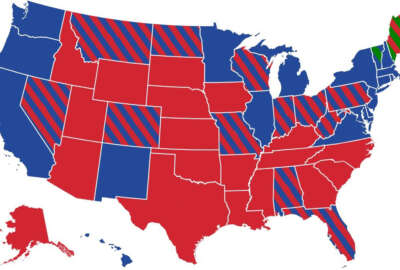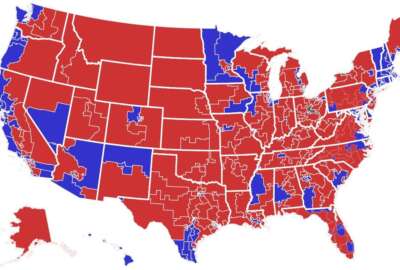
House races in these states could impact federal agencies
Many D.C.-area representatives are largely secure, according to RealClearPolitics, but the national capital region is still seeing some hotly contested races in...
Tuesday effectively brings to an end one of the most heated midterm election seasons in recent history, with several House and Senate seats hotly contested. Republicans are trying to maintain control of both houses of Congress, while Democrats are hoping for a blue wave to shift the balance of power.
For federal employees, these midterms could have significant consequences for matters such as agency reorganization plans, future pay raises and benefit changes. Many D.C.-area representatives are largely secure, according to predictions from RealClearPolitics, but the national capital region is still seeing some hotly contested races in Virginia. Click the map for a selection of key House races that could impact federal technology, management, Veterans Affairs and workforce issues.
Note: Selected races are either hotly contested, in regions heavily populated with federal workers, or include candidates on key committees. Colors indicate current representatives’ party affiliations.
Why should feds care?
Predictions from RealClearPolitics were favorable for Washington, D.C. and Maryland members of the House, which are both heavily Democratic. But across the Potomac River, Virginia’s bag was more mixed.
The most closely watched race is between Republican incumbent Barbara Comstock and Democratic challenger Jennifer Wexton. As of Friday the seat is predicted to swing blue. Comstock supported a pay raise for federal employees in 2019, but with elections largely driven by party politics she could fall to anti-Trump and anti-Republican sentiment.
For Republican Dave Brat in District 7, his race against challenger Abigail Spanberger is still considered a toss up. Brat could also fall to frustration with President Donald Trump. The Tea Party Republican entered Congress in 2014 as an outsider candidate, defeating then-House Majority Leader Eric Cantor in the primaries.
Republicans Robert Wittman and Morgan Griffith were deemed safe, as well as Democrats Bobby Scott, Donald McEachin, Don Beyer and Gerry Connolly. Connolly is the ranking member on the House Oversight and Government Reform Committee’s subcommittee on Government Operations, and has a history of supporting fed-centric measures such as federal pay raises and expressed skepticism at the administration’s plans for the FBI’s headquarters.
Odds were also leaning in favor of Republican Scott Taylor on Friday, who represents the coastal District 2, home to military and NASA hubs such as Norfolk and Hampton.
Copyright © 2024 Federal News Network. All rights reserved. This website is not intended for users located within the European Economic Area.
Amelia Brust is a digital editor at Federal News Network.
Follow @abrustWFED





